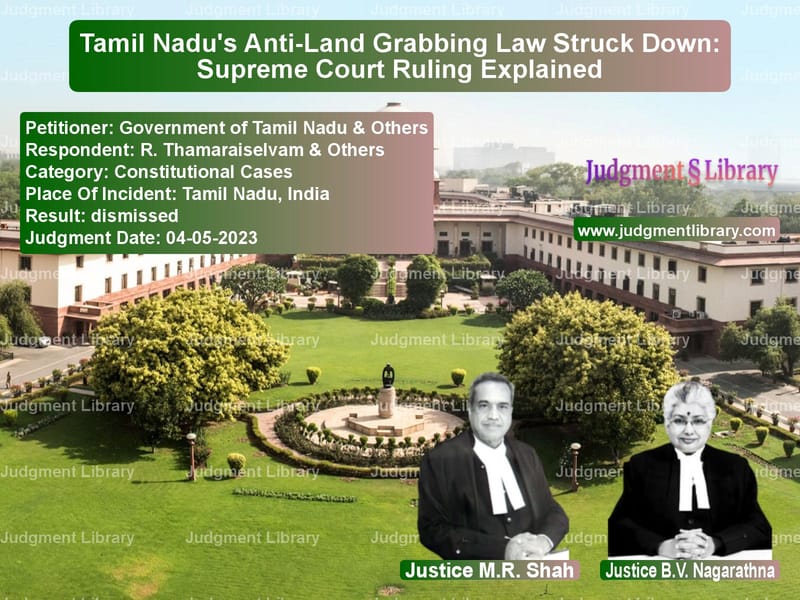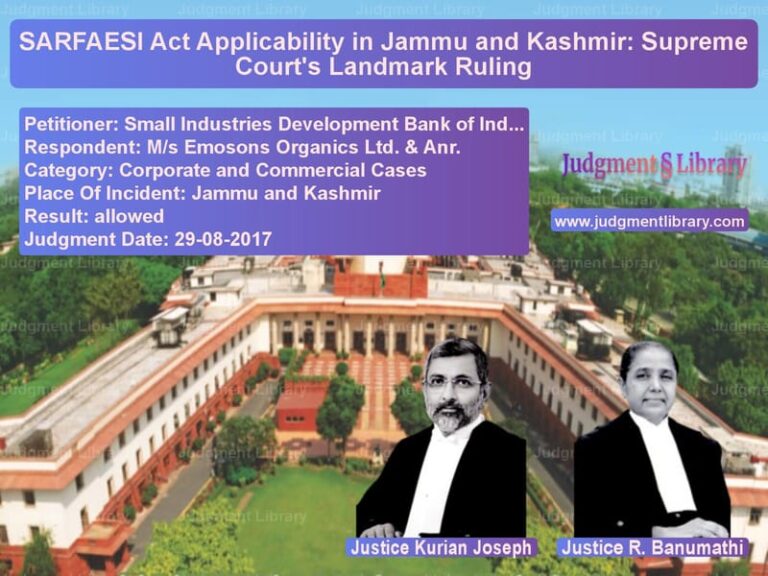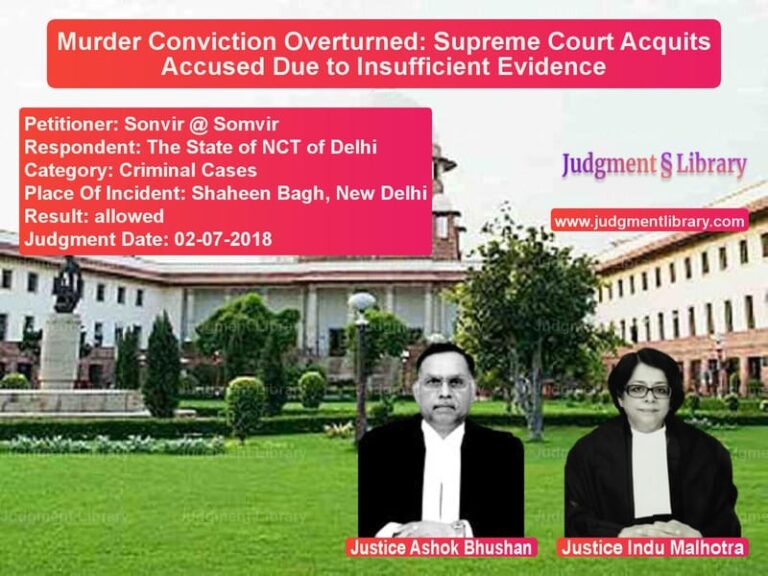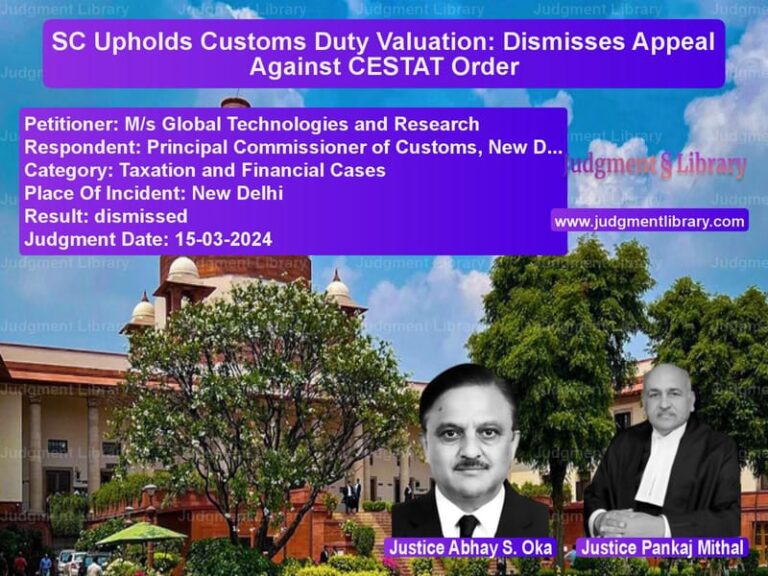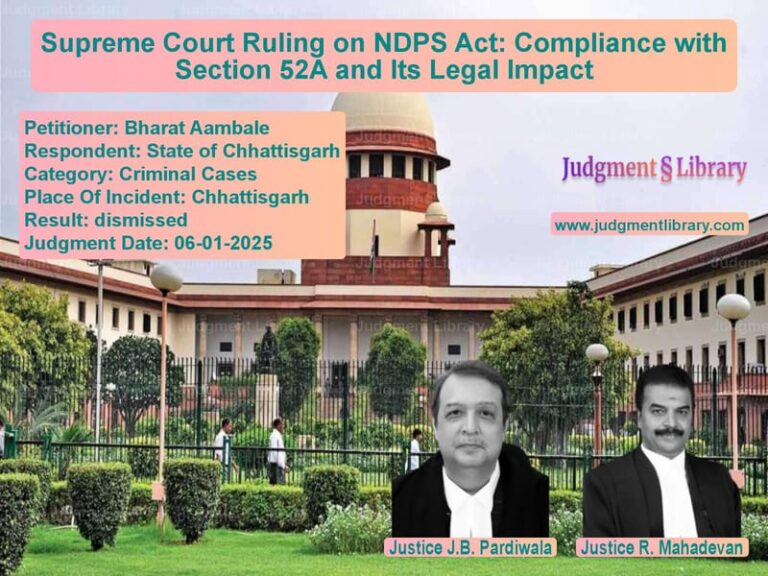Tamil Nadu’s Anti-Land Grabbing Law Struck Down: Supreme Court Ruling Explained
The case of Government of Tamil Nadu & Others vs. R. Thamaraiselvam & Others revolves around the constitutionality of Tamil Nadu’s anti-land grabbing measures. The Supreme Court of India ruled against the state’s executive orders that had established special police cells and courts for investigating and prosecuting land grabbing cases. This landmark judgment underscores the importance of legislative clarity and the need for proper legal frameworks when addressing land-related disputes.
Background of the Case
The Government of Tamil Nadu issued two government orders (G.O.) in 2011 to address increasing complaints of land grabbing:
- G.O. No. 423 (dated 28.07.2011): Sanctioned the formation of 36 Anti-Land Grabbing Special Cells across the state.
- G.O. No. 451 (dated 11.08.2011): Directed the transfer of land grabbing cases to Special Courts.
The High Court of Madras, in 2015, struck down these government orders, ruling that they lacked legislative backing and could lead to arbitrary use of power. The Tamil Nadu government challenged this decision before the Supreme Court.
Arguments Presented
Arguments by the Petitioner (Government of Tamil Nadu)
- The government argued that land grabbing was a serious issue in Tamil Nadu, with many cases of goons forcibly occupying land.
- It claimed that forming special police cells was a necessary administrative measure to expedite the investigation of land grabbing cases.
- The government contended that the term ‘land grabbing’ was inherently understood and did not need a separate legal definition.
- It further argued that potential misuse of power by the police was not a valid reason to strike down the executive orders.
Arguments by the Respondents (R. Thamaraiselvam & Others)
- The respondents contended that the government orders lacked a legal definition of ‘land grabbing,’ leading to arbitrary enforcement.
- They argued that the orders gave excessive discretion to the police, enabling selective targeting and misuse of power.
- They highlighted that land disputes should be adjudicated under existing laws, such as the Indian Penal Code (IPC) and the Transfer of Property Act.
- The respondents pointed out that states like Andhra Pradesh and Karnataka had enacted specific land grabbing prohibition laws, but Tamil Nadu had not.
Key Observations by the Supreme Court
The Supreme Court made several important observations while adjudicating the case:
- “In the absence of a statutory definition of ‘land grabbing,’ the executive orders granted excessive discretionary power to the police.”
- The orders failed to provide guidelines on what constitutes land grabbing, making them arbitrary and vulnerable to misuse.
- Without legislative support, executive orders could not establish separate procedures for handling land-related offenses.
- There was no provision in the law that permitted the creation of special courts solely for land grabbing cases without legislative backing.
- The Court cited examples from other states where land grabbing laws clearly defined the offense and outlined the process for handling such cases.
- The ruling reaffirmed that states must enact legislation instead of relying on executive orders to tackle legal issues.
Final Judgment
The Supreme Court upheld the High Court’s decision and ruled that:
- G.O. No. 423 (creating Anti-Land Grabbing Special Cells) was unconstitutional and struck down.
- G.O. No. 451 (establishing Special Courts for land grabbing cases) was also unconstitutional and struck down.
- The Tamil Nadu government was free to enact a proper law defining ‘land grabbing’ and establishing special courts through legislative means.
Implications of the Judgment
- The ruling reinforces the principle that executive orders cannot replace formal legislation.
- It prevents the misuse of police power in civil disputes over land.
- The decision clarifies that states must define offenses before enforcing laws against them.
- The Tamil Nadu government must now draft and pass a Land Grabbing Prohibition Act if it wishes to take specific legal action against land grabbers.
This Supreme Court ruling sets a precedent on the limits of executive power in legal enforcement and emphasizes the necessity of legislative clarity in land-related laws.
Petitioner Name: Government of Tamil Nadu & Others.Respondent Name: R. Thamaraiselvam & Others.Judgment By: Justice M.R. Shah, Justice B.V. Nagarathna.Place Of Incident: Tamil Nadu, India.Judgment Date: 04-05-2023.
Don’t miss out on the full details! Download the complete judgment in PDF format below and gain valuable insights instantly!
Download Judgment: government-of-tamil-vs-r.-thamaraiselvam-&-supreme-court-of-india-judgment-dated-04-05-2023.pdf
Directly Download Judgment: Directly download this Judgment
See all petitions in Fundamental Rights
See all petitions in Legislative Powers
See all petitions in Public Interest Litigation
See all petitions in Separation of Powers
See all petitions in Judgment by Mukeshkumar Rasikbhai Shah
See all petitions in Judgment by B.V. Nagarathna
See all petitions in dismissed
See all petitions in supreme court of India judgments May 2023
See all petitions in 2023 judgments
See all posts in Constitutional Cases Category
See all allowed petitions in Constitutional Cases Category
See all Dismissed petitions in Constitutional Cases Category
See all partially allowed petitions in Constitutional Cases Category

